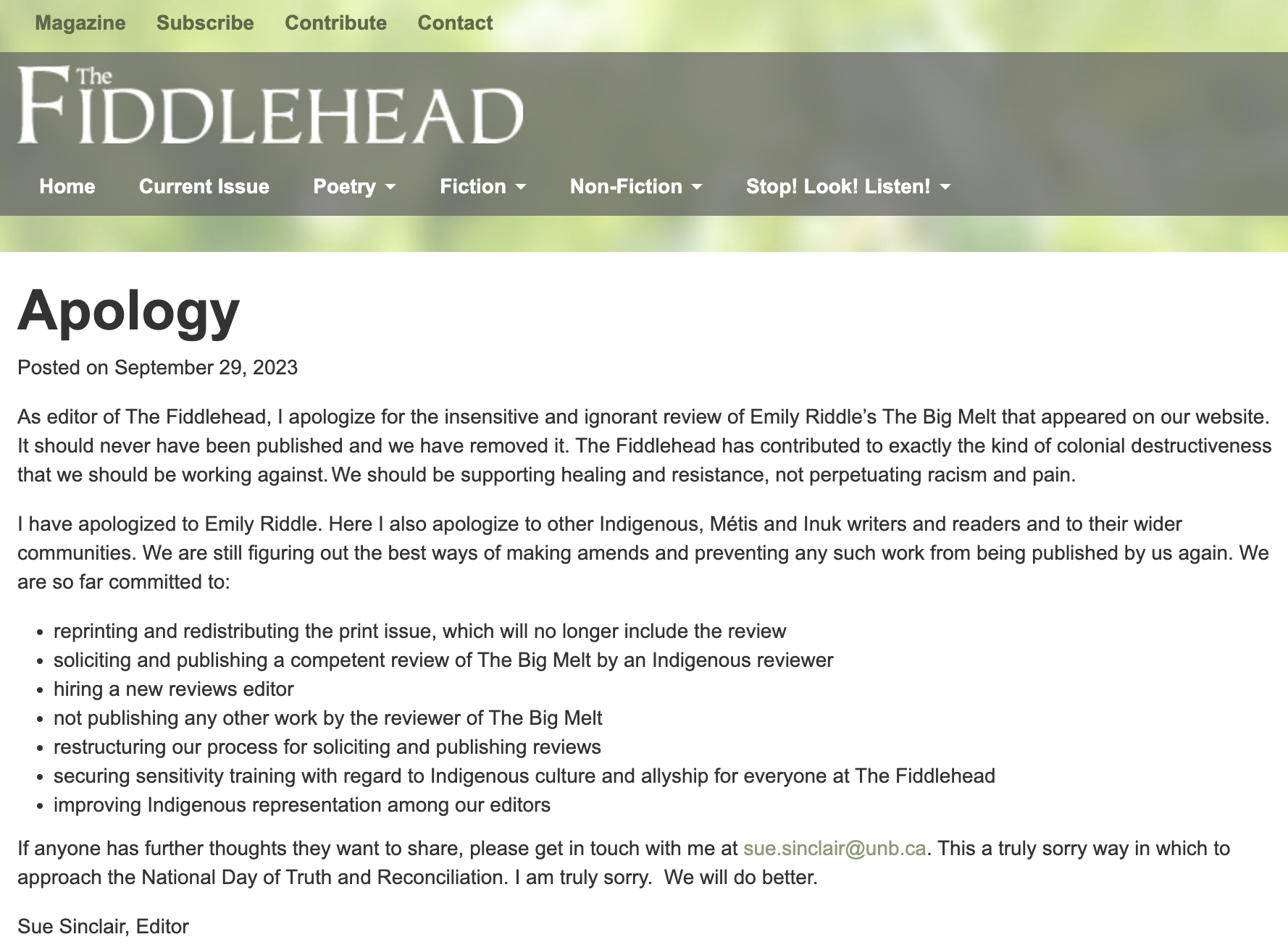Once upon a time, most of an editorial board rejected one of my stories because it was “too dark” for their readers. The lone holdout, my champion, was overruled. If it had been a conversation, I might have said that if they thought that story was dark, they’d be permanently scarred after reading my other stories. “New” is about a farmer in Manitoba who finds a  new life form in his field. His dedication to the survival of these creatures puts his marriage and business at risk. I reread the story, hoping to the find the “dark” bits that set off the board. No one is murdered, assaulted, or raped. No one is particularly cruel. No one is much worse off than when the story began. Where’s the dark? What are they talking about? And if they don’t like dark stories, are they looking for some light reading? Surely that would be the ultimate insult to a literary journal. And if the story really were too dark for the readers, how would an editor know this? Do readers complain when a story is too dark, or did the board just make an assumption about the fragility and sensitivities of their readers?
new life form in his field. His dedication to the survival of these creatures puts his marriage and business at risk. I reread the story, hoping to the find the “dark” bits that set off the board. No one is murdered, assaulted, or raped. No one is particularly cruel. No one is much worse off than when the story began. Where’s the dark? What are they talking about? And if they don’t like dark stories, are they looking for some light reading? Surely that would be the ultimate insult to a literary journal. And if the story really were too dark for the readers, how would an editor know this? Do readers complain when a story is too dark, or did the board just make an assumption about the fragility and sensitivities of their readers?
Even stranger, the same journal previously published a story of mine that featured low-level child abuse, a clinically depressed mother, and a father with significant anger issues. The dark label would definitely stick to that one.
As you may have noticed, I don’t like being rejected because my work is dark. If you think my writing sucks, that’s a clear, straightforward rejection I can understand and accept. Too dark? Isn’t that kind of like rejecting a painting because it has too much brown or a song because it has too many notes? I have difficulty with rejecting work based on subject matter. I don’t give a damn about baseball, but Michael Lewis made it interesting in Moneyball. I’m as sick of zombies as everyone was of vampires ten years ago, but The Walking Dead survives and thrives on writing and direction, not subject matter. Dark, light, funny, sad, weird, demented, twisted, punishing, uplifting. Whatever. To me the writing is everything, and to be rejected for other reasons is baffling and frustrating.
More recently, a journal tentatively selected one of my stories for publication later in the fall. Guess what. It’s dark. So dark that I didn’t think it had a chance. If published, this piece will face the resurgent forces of moral panic and political correctness that have released a flood of cry bullies and safe space refugees on campuses across North America. It’s nice to know that at least one editor is willing to take on an alcoholic vigilante who starts pasting The Big Circle gang and anyone else who gets in his way.




“I have difficulty with rejecting work based on subject matter.”
I agree strongly that subject matter is totally irrelevant to the quality of a literary (or any artistic) work. The opposite is also true: no amount of good or life-affirming subject matter can improve the quality of a literary work if it is poorly written. Writing and style are all that are important in a literary work.
I find it so disappointing that a literary journal would reject a story because it is too dark. Disappointing … and I would also question the literary judgment of any editor who could reject based on this criterion. He either knows nothing about writing, or he is so PC-protective of his tender readers or his tender funders that he has become a whore or a toady.
I don’t recall having any of my works rejected for being too dark, but the one I do remember is the agent who rejected by novel “Will’s Dead Wife” (available on Amazon!: https://www.amazon.ca/Wills-Dead-Wife-Wayne-Jones-ebook/dp/B008FK4C10/) for one reason or another, but in her rejection letter hoped that I was doing better, because she assumed that I had not made up the protagonist’s story about having trouble adjusting to the death of his wife — it _must_ have happened to me. I remember thinking: Jesus, if the writing was that evocative, why the hell did you reject it? But also: What the hell does whether a fictional work is true or not have to do with its quality?
One of my literary heroes, as my friends who are sick of hearing me blather on about him know, is the great Vladimir Nabokov. In the afterword to his novel “Lolita” he addresses this issue of content being a judgment point on which many people accept or reject fiction, and then leans to “aesthetic bliss” as being the most important thing:
“There are gentle souls who would pronounce Lolita meaningless because it does not teach them anything. I am neither a reader nor a writer of didactic fiction, and despite John Ray’s assertion, Lolita has no moral in tow. For me a work of fiction exists only insofar as it affords me what I shall bluntly call aesthetic bliss, that is a sense of being somehow, somewhere, connected with other states of being where art (curiosity, tenderness, kindness, ecstasy) is the norm. There are not many such books. All the rest is either topical trash or what some call Literature of Ideas, which very often is topical trash coming in huge blocks of plaster that are carefully transmitted from age to age until somebody comes along with a hammer and takes a good crack at Balzac, at Gorki, at Mann.”
I would choose a well-written dark story about a pedophile any day over a poorly written one about a nice man who does nice things.
Amen, brother. There is so much stupid still swirling around Lolita. Half the idiots think it’s a love story. The other half think it’s a manual. Both groups have not read the book.